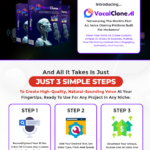Affiliate marketing is a powerful way to earn passive income online. But to truly succeed, you need to drive consistent traffic to your website. This is where effective strategies come into play.
In this blog, we’ll dive deep into the world of website traffic and explore proven techniques to boost your affiliate marketing efforts. From keyword optimization to content creation and social media marketing, we’ll cover everything you need to know to attract more visitors and ultimately increase your earnings.
So, if you’re ready to take your affiliate marketing game to the next level, let’s get started!
My Proven Way to Make $100-$200 Per Day With 0 Investment – Watch THIS FREE Video to START >>

Keyword Research and Optimization
Keyword research is the foundation of successful affiliate marketing. It’s like building a house – without a strong foundation, the structure is likely to crumble. In the world of affiliate marketing, keywords are the foundation that attracts visitors to your website.
Effective keyword research involves identifying the terms and phrases that your target audience is using to search for products or services related to your niche. By understanding these keywords, you can optimize your website content and meta tags to rank higher in search engine results pages (SERPs) and attract more organic traffic.
Effective Keyword Research Tools and Techniques
- Google Keyword Planner: This free tool from Google offers valuable insights into keyword search volume, competition, and related terms.
- SEMrush: A comprehensive SEO toolset that includes a powerful keyword research feature, allowing you to analyze competitors’ keywords and identify opportunities.
- Ahrefs: Another popular SEO tool that provides detailed keyword data, including search volume, difficulty, and related terms.
- Keyword research tools within content management systems (CMS): Many CMS platforms, such as WordPress and Shopify, offer built-in keyword research tools or integrations with external tools.
Optimizing Website Content and Meta Tags
- Keyword placement: Incorporate your target keywords naturally throughout your website content, including in the title, headings, subheadings, and body text.
- Meta tags: Optimize your meta title and meta description to include relevant keywords and entice users to click on your search results.
- Keyword density: Use keywords strategically to avoid keyword stuffing, which can negatively impact your search rankings.
- Related keywords: Expand your keyword targeting by incorporating related terms and phrases that your audience might be searching for.
The Role of Long-Tail Keywords
Long-tail keywords are more specific phrases that have lower search volume but often have higher conversion rates. For example, instead of targeting the generic keyword “shoes,” you could focus on long-tail keywords like “women’s running shoes size 8” or “vegan leather sneakers.”
By targeting long-tail keywords, you can attract highly qualified traffic that is more likely to make a purchase. This can significantly improve your affiliate marketing ROI.
Quality Content Creation
In the world of affiliate marketing, content is king. High-quality, valuable content not only attracts visitors to your website but also establishes you as an authority in your niche. It’s the cornerstone of building trust and credibility with your audience.
The Importance of High-Quality, Valuable Content
- User engagement: Engaging content keeps visitors on your site longer, increasing the chances of them clicking on your affiliate links.
- Search engine rankings: Search engines reward high-quality content with higher rankings in search results.
- Brand reputation: Consistently producing valuable content helps to build a positive brand reputation.
- Social shares: Shareable content can lead to increased social media visibility and traffic.
Tips for Writing Engaging and Informative Content
- Know your audience: Understand the needs, interests, and pain points of your target audience.
- Solve problems: Offer solutions to common problems or questions related to your niche.
- Tell stories: Use storytelling techniques to make your content more engaging and memorable.
- Use visuals: Incorporate images, videos, or infographics to break up text and enhance understanding.
- Be concise: Avoid excessive jargon or technical terms that may confuse your readers.
- Proofread carefully: Ensure your content is free of errors and easy to read.
The Role of Content Formats
- Blog posts: A versatile format for sharing information, tips, and tutorials.
- Videos: A great way to visually explain complex topics or demonstrate products.
- Infographics: A visually appealing way to present data or statistics.
- Podcasts: A popular format for audio-based content, ideal for interviews or discussions.
- Ebooks: A valuable resource for in-depth information, often used as lead magnets.
The Importance of Content Consistency and Updating
- Regular updates: Keep your website fresh and relevant by publishing new content regularly.
- Content calendar: Create a content calendar to plan and schedule your content.
- Update existing content: Review and update older content to ensure it remains accurate and relevant.
- Monitor performance: Track the performance of your content to identify what’s working and what’s not.
My Proven Way to Make $100-$200 Per Day With 0 Investment – Watch THIS FREE Video to START >>
On-Page SEO
On-page SEO refers to the optimization of individual web pages to improve their search engine rankings. It involves a variety of techniques that make your content more accessible and relevant to search engines.
Key On-Page SEO Factors
- Page speed: Slow-loading pages can negatively impact user experience and search engine rankings. Optimize your website’s speed by compressing images, minifying code, and leveraging a content delivery network (CDN).
- Mobile-friendliness: With the increasing number of mobile users, it’s essential to ensure your website is fully responsive and optimized for smaller screens.
- Internal linking: Linking to relevant pages within your own website helps search engines understand the structure and hierarchy of your content.
- Header tags: Use header tags (H1, H2, H3, etc.) to organize your content and provide clear signals to search engines.
- Keyword density: Incorporate your target keywords naturally throughout your content, but avoid keyword stuffing.
- URL structure: Create clean and descriptive URLs that include relevant keywords.
Optimizing Website Structure and Navigation
- Clear navigation: Make it easy for users to find what they’re looking for with a well-structured navigation menu.
- Site architecture: Organize your content into logical categories and subcategories.
- Breadcrumbs: Implement breadcrumbs to show users their current location within your website.
- Sitemaps: Create XML and HTML sitemaps to help search engines crawl and index your website.
The Importance of User Experience
A positive user experience is crucial for both search engine rankings and conversions. Focus on creating a website that is easy to navigate, visually appealing, and loads quickly.
- User-friendly design: Use a clean and intuitive layout.
- Clear calls to action: Guide users towards your desired actions, such as making a purchase or signing up for a newsletter.
- Mobile optimization: Ensure your website is easy to use on mobile devices.
- Page speed: Optimize your website’s loading speed to reduce bounce rates.
Off-Page SEO
Off-page SEO refers to the strategies and tactics used to improve your website’s search engine rankings by focusing on external factors. One of the most crucial aspects of off-page SEO is building high-quality backlinks.
The Importance of Building High-Quality Backlinks
Backlinks are links that point to your website from other websites. Search engines view backlinks as a vote of confidence, and having more high-quality backlinks can significantly boost your search engine rankings. However, it’s important to focus on quality over quantity.
Acquiring Backlinks Through Guest Posting
- Find relevant websites: Identify websites in your niche that accept guest posts.
- Pitch your idea: Offer to write a valuable piece of content for the website.
- Create high-quality content: Write an informative and engaging article that provides value to the target audience.
- Negotiate a backlink: Ensure that the guest post includes a backlink to your website.
Acquiring Backlinks Through Directory Submissions
- Choose reputable directories: Select directories that are relevant to your niche and have a good reputation.
- Follow submission guidelines: Adhere to the specific requirements and guidelines of each directory.
- Provide accurate information: Ensure that the information you submit is accurate and up-to-date.
Acquiring Backlinks Through Social Media
- Share your content: Promote your content on social media platforms to increase visibility and attract backlinks.
- Engage with your audience: Interact with your followers and build relationships.
- Encourage sharing: Encourage users to share your content on social media.
The Role of Local SEO
If you’re targeting a specific geographic area, local SEO is essential. Local SEO involves optimizing your website to rank higher in local search results.
- Google My Business: Create a Google My Business profile and optimize it with accurate information.
- Local citations: Ensure your business information is consistent across various online directories.
- Local backlinks: Acquire backlinks from local websites and directories.
- Keyword optimization: Use relevant local keywords in your content and meta tags.
- Geo-targeting: Target your content to specific geographic areas using location-based keywords and targeting options.
Social Media Marketing
Social media platforms offer a powerful way to connect with your target audience, build brand awareness, and drive traffic to your website. For affiliate marketers, social media can be a highly effective tool for promoting products and services.
The Importance of Social Media for Affiliate Marketing
- Audience reach: Social media platforms have a vast user base, allowing you to reach a large number of potential customers.
- Engagement: Social media provides opportunities for interaction and engagement with your audience.
- Brand building: Consistent social media presence helps to build brand recognition and trust.
- Traffic generation: Social media can be a significant source of website traffic.
- Lead generation: Social media can be used to capture leads and nurture relationships with potential customers.
Tips for Creating Engaging Social Media Content
- Know your audience: Understand the interests and preferences of your target audience.
- Use visuals: Images, videos, and infographics can make your content more engaging.
- Tell stories: Share stories and experiences related to your niche.
- Use relevant hashtags: Use relevant hashtags to increase your content’s visibility.
- Run contests and giveaways: Encourage engagement by offering incentives.
- Respond to comments: Interact with your followers by responding to comments and messages.
The Role of Social Media Platforms in Driving Website Traffic
- Share links: Share links to your website content on social media platforms.
- Social media ads: Use paid advertising on social media platforms to target specific audiences.
- Influencer marketing: Collaborate with influencers in your niche to promote your products or services.
- Social media buttons: Add social media sharing buttons to your website to encourage users to share your content.
The Importance of Social Media Optimization for Affiliate Marketing
- Profile optimization: Complete your social media profiles with relevant information and a professional profile picture.
- Consistent branding: Maintain a consistent brand image across all your social media channels.
- Analytics: Use social media analytics to track the performance of your content and identify areas for improvement.
- Cross-promotion: Promote your social media channels on your website and other marketing materials.
My Proven Way to Make $100-$200 Per Day With 0 Investment – Watch THIS FREE Video to START >>
Conclusion
In conclusion, effective affiliate marketing requires a multifaceted approach that combines keyword optimization, quality content creation, on-page SEO, off-page SEO, and social media marketing. By implementing these strategies, you can increase your website’s visibility, attract more targeted traffic, and ultimately boost your affiliate earnings.
Remember, consistency is key. Continuously monitor your progress, analyze your results, and make adjustments as needed. With dedication and perseverance, you can achieve success in affiliate marketing.









